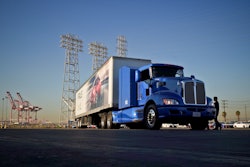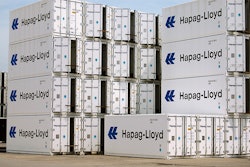Sustainability Benefits Exceed Expectations For A Majority Of Firms: Study
The majority of businesses say that the benefits resulting from their sustainability initiatives have exceeded expectations, according to an international survey by Accenture, London. But a hard core minority of businesses does not see sustainability as a critical or strategic investment.
The survey of 247 c-suite decision makers in the U.S., U.K. and China reveals that 72 percent think the benefits of their sustainability initiatives exceeded expectations. Only four percent failed to meet expectations. Business leaders identify the main benefits as reputation and trust (cited by 49 percent of respondents), lower costs (42 percent) and an improved brand (41 percent).
Although two thirds (68 percent) of senior business decision makers see sustainability as an integrated part of their business, a hard core of 32 percent say it is peripheral. While 66 percent see sustainability as an investment, 34 percent see it as more of a cost. And although 60 percent believe their company is investing the right level in sustainability initiatives, 28 percent say their business invests too much or far too much. The same proportion state that businesses in general are doing too much to make their working practices more sustainable.
Ninety-three percent of respondents say their company currently has sustainability initiatives. The most common focus areas are reducing the amount of electricity used and green IT (both cited by 51 percent), followed by sustainability talent and skills initiatives (47 percent) and the development of sustainability based new products and services (44 percent).
“The good news is that companies are already seeing sustainability investments generate returns in terms of market success and cost performance,” says Bruno Berthon, managing director, Accenture Sustainability Services. “The irony is that the hardcore third of businesses that don’t enjoy these benefits are likely the ones who think sustainability is peripheral to their business. Only by placing it at the heart of commercial strategy can sustainability be a channel to growth and innovation.”
Drivers And Barriers
There is a disparity between assumed and actual drivers of sustainability initiatives. Companies expect that business in general will be driven by three key external factors: investment pressure, regulations and customer expectations. In reality, however, the top motivations are a genuine concern for the environment and society (cited by 53 percent) and reducing energy and material costs (50 percent). Also important are customer expectations (47 percent) and an opportunity for higher margins and business growth (45 percent).
Cost is the most significant barrier to sustainability initiatives, with 43 percent of respondents identifying it. Other key barriers include the inability to measure sustainability initiatives (31 percent), the lack of government / local government incentives (30 percent) and the belief that one company can’t make a difference to global warming (29 percent).
“It’s clear that sustainability is no longer merely a matter of compliance, but a proactive way to energize commercial strategy,” says Berthon. “Measuring sustainability performance and results is the first practical step business leaders need to make, but requires new skills and proven methodologies. Get it right and sustainability champions can form a business case, galvanize internal support and actively secure shareholder support.”
Role Of Government
When asked who should be more responsible for ensuring progress is made in a sustainable way, 41 percent say businesses should, versus 36 percent who think government should be more responsible and 23 percent who identify individuals. Almost half (47 percent) of respondents think that business is doing the most to promote sustainable progress, against only 28 percent who think governments are and 26 percent who identify individuals.
Although many business leaders may want more government incentives to encourage them to act, they are satisfied with the support from the financial sector. Forty-five percent say that the financial sector is, itself, investing the right amount in sustainability initiatives, although 28 percent say it invests too little and 26 percent too much. Meanwhile, 75 percent of c-suite decision makers have confidence in the financial sector to provide funding for sustainability initiatives.
DNA On The Menu In 11,000 Restaurants
More than 11,000 U.S. restaurants that serve Braveheart Black Angus Beef are now able to assure diners a guarantee of quality about their premium Angus beef through DNA TraceBack, the nation’s first-of-its-kind assurance of quality and commitment.
Braveheart Black Angus Beef is the premier brand of quality Angus beef exclusively supplied by Performance Food Group (PFG), Richmond, VA.
DNA TraceBack is the proprietary DNA-based traceability system developed by IdentiGEN North America, Lawrence, KS. PFG has teamed with IdentiGEN to set a new standard in the U.S. food service industry by using DNA to assure restaurant patrons that the beef they’re eating came from corn-fed Angus cattle raised in the American Midwest.
“We’re using DNA to assure our customers that the precise standards behind Braveheart Black Angus Beef are being met,” says George Holm, president and CEO of PFG. “It’s part of our fearless commitment to quality.”
PFG sets exacting standards for its cattle. All Braveheart beef products—from steaks to hamburger—must come from Angus cattle humanely raised in the Midwest on an all-vegetarian, corn-based diet for superior flavor and tenderness. All Braveheart beef is processed to unmatched high standards in the industry, using the most modern and effective techniques to produce a consistent, high-yield, safe and superior product.
Deployment of Braveheart Black Angus Beef with DNA TraceBack will begin today at four processing plants and at the more than 11,000 restaurants, food service outlets and grocery retailers that offer Braveheart Black Angus Beef. Braveheart’s restaurant customers will then be able to include the DNA TraceBack seal on their menus.
Widely used in Europe for more than a decade, DNA TraceBack employs the animal’s unique DNA profile to inexpensively and quickly verify brand claims for beef and pork.
DNA will also be used to continually improve the genetics of the Braveheart Black Angus cattle herds to favor those animals that deliver the best qualities for a premium end product.
FDA’s First FSMA Rules
To Take Effect In July
The U.S. Food and Drug Administration has announced two new regulations that will help ensure the safety and security of foods in the United States.
The rules are the first to be issued by the FDA under the new authorities granted the agency by the FDA Food Safety Modernization Act (FSMA), signed into law by President Obama in January. Both rules will take effect July 3, 2011.
The first rule strengthens FDA’s ability to prevent potentially unsafe food from entering commerce. It allows the FDA to administratively detain food the agency believes has been produced under insanitary or unsafe conditions. Previously, the FDA’s ability to detain food products applied only when the agency had credible evidence that a food product presented was contaminated or mislabeled in a way that presented a threat of serious adverse health consequences or death to humans or animals.
Beginning in July, the FDA will be able to detain food products that it has reason to believe are adulterated or misbranded for up to 30 days, if needed, to ensure they are kept out of the marketplace. The products will be kept out of the marketplace while the agency determines whether an enforcement action such as seizure or federal injunction against distribution of the product in commerce is necessary.
Before this new rule, the FDA would often work with state agencies to embargo a food product under the state’s legal authority until federal enforcement action could be initiated in federal court. In keeping with other provisions in the FSMA, FDA will continue to work with state agencies on food safety and build stronger ties with those agencies.
The second rule requires anyone importing food into the United States to inform the FDA if any country has refused entry to the same product, including food for animals.
This new requirement will provide the agency with more information about foods that are being imported, which improves the FDA’s ability to target foods that may pose a significant risk to public health.
This new reporting requirement will be administered through the FDA’s prior notice system for incoming shipments of imported food established under the Public Health Security and Bioterrorism Preparedness and Response Act of 2002.
With prior notice, in the event of a credible threat for a specific product or a specific manufacturer or processor, the FDA is able to mobilize and assist in the detention and removal of products that may pose a serious health threat to humans or animals.
“The new information on imports can help the FDA make better informed decisions in managing the potential risks of imported food entering the United States,” Taylor says. “These rules will be followed later this year and next year by a series of proposed rules for both domestic and imported food that will help the FDA continue building the new food safety system called for by Congress.”
The issuance of these rules is the latest accomplishment of FDA in implementing the new food safety law. In April, the FDA launched a consumer-friendly web search engine for recall information and issued the first annual report to Congress describing FDA’s activities in protecting the U.S. food supply. FDA also released a guidance document to the seafood industry on ways to reduce or eliminate food safety hazards.
In addition, since the law was signed, the FDA has held two large public meetings with industry and consumer groups on the import and preventive control provisions of the law, and reached out extensively to partners in other federal, state, and foreign governments.
U.S. Foodservice In
Acquisition Mode
U.S. Foodservice has acquired the local restaurant distribution business of White Apron, a supplier and processor of premium fresh meats based in Brea, CA. The business will be integrated into the U.S. Foodservice-Los Angeles division in La Mirada, CA.
“The addition of the White Apron local restaurant distribution business will expand our customer base to include some of the leading restaurants in Southern California,” says Gene Steffes, division president, U.S. Foodservice-Los Angeles. “White Apron will continue to operate as a wholesale meat supplier and processor, supplying high-quality meats that help U.S. Foodservice customers succeed.”
White Apron will be a preferred supplier to U.S. Foodservice of premium fresh meats in the Southern California market. In addition, White Apron will continue to service its retail and other non-distribution customers.
Last month, U.S. Foodservice acquired Great Western Meats, a broadline foodservice distributor and provider of fresh-cut portion meats in Central Florida. Great Western Meats operates two facilities in Orlando—a distribution warehouse and meat cutting facility. The warehouse will integrate into the recently expanded U.S. Foodservice distribution center in Port Orange, FL, in July.
The meat cutting facility will continue to operate and will provide fresh-cut meats for U.S. Foodservice’s customers in Florida under the Stock Yards brand name. U.S. Foodservice’s meat cutting operation in Clearwater,FL, will close June 24 and that volume will be transferred to Great Western Meats’ facility, which will be renamed Stock Yards-Florida.
“The addition of the Great Western Meats broadline foodservice business and meat cutting operation will expand our customer base and presence across the Orlando area,” says Keith Campbell, region president, U.S. Foodservice-Florida. “In addition, Great Western Meats’ customers will now have access to more than 14,000 products and the entire range of services offered by U.S. Foodservice-Port Orange.”
Volatile Fuel Prices Top
Fleet Manager’s Concerns
Corporate fleet managers rate higher and more volatile fuel prices as their top concern in 2011, according to a recent survey conducted by GE Capital Fleet Services, Eden Prairie, MN. More than a quarter of respondents (29 percent) said the recent spike in fuel prices has made this issue their top concern, up from 12 percent a year ago.
The survey of 105 fleet managers, conducted recently at the 2011 NAFA Institute & Expo in Charlotte, NC, found that driver safety and cost savings were also top areas of concern. Concern for driver safety increased in 2011 to 28 percent from 21 percent in 2010, while cost savings fell as a priority but remained important at 23 percent, down from 36 percent in 2010.
Moreover, cost savings are now a bigger focus for executive management according to fleet managers. Sixty-four percent of those surveyed indicated that executive management’s main focus for fleets is cost savings, up from 48 percent in 2010.
“Volatile fuel prices are an overriding concern today for corporate fleet managers, given the current environment,” says Clarence Nunn, CEO of GE Capital Fleet Services. “We are seeing a corresponding increase in interest from our fleet customers for solutions in fuel, telematics and maintenance programs that will help them combat rising fuel costs and improve operational efficiency.”
Other key findings from the survey include:
Analytics—29 percent of fleet managers use fleet analytics to improve operational efficiency and 27 percent noted that analytics helped them achieve cost savings;
Lease accounting—between a third and half of fleet managers (40 percent) feel they don’t have a good enough grasp of how pending changes to lease accounting rules (FASB) will affect fleet leasing;
Electric vehicles—28 percent said they plan to incorporate electric vehicles into their fleets within the next 12 months.














